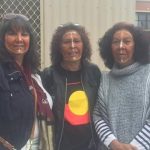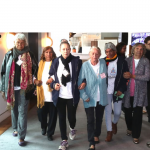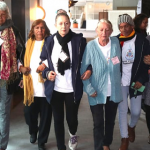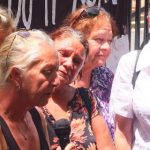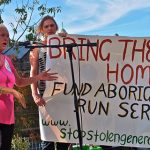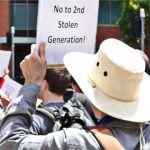Preventing Aboriginal Child Removals: An Interview With Nelly’s Healing Centre’s Helen Eason
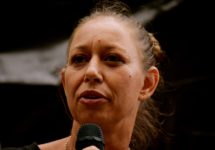
The 2019 Productivity Commission report outlines that in June 2018 there were 6,766 First Nations children in out-of-home care in NSW. This means Aboriginal and Torres Strait Islander kids made up 39 percent of youths in state care, while only accounting for 5 percent of the population under 18.
Referred to as the continuing stolen generation, the overrepresentation of Indigenous children in state care means that forced adoption laws that were rushed through state parliament late last year are going to disproportionately affect Indigenous communities.
The new laws require that a decision on whether a child in out-of-home care can be returned to their family must be made within 24 months. And if it’s decided they can’t, that child must be immediately adopted out or placed in permanent guardianship.
However, this two year timeframe is way too short a period to deal with any chronic situations prior to having a child returned. And as First Nations children are already overrepresented in state care, it’s highly likely many will be permanently removed from their families.
A discriminatory system
Another government institution well-known for its stark overrepresentation of Aboriginal and Torres Strait Islander people is the NSW prison system. And this is especially true when the number of Indigenous women being detained is considered.
In March this year, there were 996 adult women prisoners being held in NSW correctional facilities, and 338 – or 34 percent – of them were First Nations women. However, Aboriginal women only make up 3 percent of the overall general populace.
And these Indigenous women – 80 percent of whom are mothers – are often stuck in a cycle that involves incarceration, release into homelessness and reoffending. Rehabilitative services on the inside are slim on the ground, and culturally appropriate post-release programs don’t even exist.
A holistic approach
And that’s why Nelly’s Healing Centre is stepping into the picture. The Sydney-based service will be providing support programs for Aboriginal women who’ve had their children removed, as well as to those who’ve spent time in prison.
Nelly’s founder and CEO Helen Eason understands the out-of-home care system, as she’s had her children removed in the past. The Gomeroi and Biripi woman makes clear that her centre will be working to prevent children being taken in the first place, as well as providing support to families already dealing with removals.
Ms Eason is also a member of Grandmothers Against Removals. Founded by her mother Aunty Hazel Collins back in 2014, the Aboriginal activist group currently has a focus on getting the newly enacted forced adoption laws revoked.
Sydney Criminal Lawyers spoke to Helen Eason about how the Nelly’s Healing Centre will also be providing services to women post-release and on the inside, the link between state care and incarceration and why the 24 month limit the new adoption law dictates is unrealistic.
Firstly, you’re in the midst of establishing Nelly’s Healing Centre in Sydney, which is a holistic support service for Aboriginal women and their families, providing programs embedded in culture. Helen, what sort of specific support services will Nelly’s offer?
We’ll be dealing with well-being programs that improve finance around housing outcomes and expanding responsibility and capacity. Also, mental and emotional health, so that will reduce domestic violence rates and improve mental health outcomes for parents and children.
Then there’s physical health, which will cover antenatal, dental, sexual health, diet and nutrition. We’ll also cover children’s needs, which is education, development, parenting and child protection. This will reduce the out-of-home care rate, improve educational attainment and employment.
We’ll have a drug and alcohol program, which will involve counselling and education. And we’ll have family reconciliation. This will be organising visitation, access to children, building connections, mediation, as well as family finding: connecting people back with family.
So, that will give us the opportunity to go in and advocate for the parent, instead of them having to deal with the department. It will be us going in there. We’ll say, “OK, we’re working with this client. What do you expect from them?” And then we’ll go back and tick off the boxes with our client.
The other thing that makes us different is that we’ll be starting that journey with them, and we’ll never leave, whether they’ve got a connection with their own communities, or whether they stay here in Sydney.
If they go back to their own community, we will see what services are offered there. That will give us another way to assess how services are being delivered in other areas.
It will be a wraparound approach with each client. And it won’t be just with them, we’ll be working with the family as well. We’ll stay on that journey, and when they leave the centre, we will be following up on a weekly to fortnightly to monthly basis.
Currently, there are no support services available to First Nations mothers, or their families, who have their children removed by the state.
Helen, you had your children removed in the past. How much of a need is there for support services that cater for this specific situation?
There’s a major need. When they go to the hospital and they’re put on birth watch, they’ve got nowhere to go. So, that’s why the centre will be important. If a woman is put on birth watch, instead of taking that child, they can send the mum and baby to us.
That would give us a full three months with them to decide whether mum is capable of keeping the baby, or whether we need to do a bit more work, and whether the baby needs to go to a family member. But, that’s up to us to decide and our client, not up to the department.
So, you’re talking about preventative measures here and not after the fact?
We will be dealing with after the fact, because it’s the preservation and restoration.
But, you’re also talking about before the fact?
Yes. They put our women on birth watch. So, I want to know who they’ve got on birth watch. We want to be working with them, even before they go into hospital to have that baby. We need to stop that removal. And we can do that. It’s something everyone else is failing to achieve.
What is birth watch?
When you’re pregnant, the department will put you on birth watch. If you’re on birth watch, it’s guaranteed that your baby is going to be removed from you.
And you’re talking about working with these women to prevent them having their children removed in the end?
Yes. Send them to us. And let us show you a different outcome. There’s nowhere else doing that. This service has never been put together before.
What are some of the other issues around child removals that Nelly’s can help mothers and their families with?
They’ve got to continually tell their story. I don’t know how many people they sent me to. And I had to continually tell my story. It doesn’t matter how many times you tell that story, you walk out of that office and you’re suffering because you’ve just relived trauma. There’s no support for that.
So, it’s not about our girls coming in and continually telling their story. It’s about us educating them about the system.
If we educate our daughters about the system – they already know the effects because they’re living them – so if we start educating them about it and how it affects the kids, the partners and the rest of the family, that will turn the light bulb on in their head.
That’s what everyone’s tale is. I never received any of that. My kids were wards of the state three times. I’ve been a mum for 24 years, and 16 years of that was having DOCS in my life. There was no support. And as soon as you’re a high case, like I was, that’s it, you’re shifted on to the next person. And then you’re shifted on to another.
That’s how we fall through the service gap. And nothing is every recognised. There’s no outcome, because nothing is ever achieved. You’re left in that struggle on your own.
Last year, the Berejiklian government passed new adoption laws that mean a decision on whether a child can be returned to their family must be determined within 24 months or they’ll be permanently removed.
You understand the out-of-home care system. What do these new laws mean for families who’ve had children removed?
It means they’ll just give our babies away and we have no say. They don’t have to let us know if they are adopting our kids out. They don’t let us know where our kids are.
And 24 months? That’s just so unrealistic. Especially, when we’ve been traumatised for so long. Intergenerational trauma goes back so many years. There’s going to be some cases that take longer than others. So, how can they set a timeframe on how long it’s going to take someone to get well?
We might be working with a girl for three years. But, that doesn’t mean that they can’t be a parent.
They wrote me off, but I rose. And there are so many other girls that are going to rise just like I did.
We’re going to educate them. We are going to empower them. We are going to give them employment. And we’re going to be there to work on that journey with them. They’re not going to be left on their own.
And are these new laws having an impact yet?
We haven’t been told anything. I’m about to call a meeting with Gareth Ward, who took over Pru Goward’s position as the minister for FACS. We want to see what he’s going to do, because we are going to fight. These laws need to go.
You’re trying to prevent these children being placed in out-of-home care. And in the past, you’ve pointed to the link between children who are placed in state care and incarceration. Can you speak a bit about that?
As soon as our kids come of age, they turn their backs on them. They don’t give our kids leaving care packages. They don’t support our kids. And then they hit the street. They usually hit the drugs. And then they’re doing the crime.
You’re taken by a department. You’re screwed over as a kid by a system. And then you’re put into another system.
Our kids are under the minister until they’re 18. So, when our kids are under the minister, which most of our kids in custody are, they don’t even provide support, like solicitors. They don’t give any support to our kids. They don’t give our kids anything whatsoever.
It’s just continual abuse from the system. And that’s what we need to break. That’s what we’re going to break. Because if they’re not in the juvenile system, they’re definitely going to end up in gaol.
And lastly, Helen, you’re getting Nelly’s set up at present. What’s the next step?
We’re going to be up and running, hopefully, by next month. We’re just about to go into the prisons and start building rapport with our women – to start building that relationship, so that we can have these women come and work with us, while we’re getting the whole service up and running.
So, you’ll be working with women who are coming out of prison as well?
Yes. Women that come out of prison. Women that are in prison. Women that have been to prison. The women that we want to target are the ones that have been written off by the system.
We’ve got girls that have been going into prison for over 20 years. Isn’t that telling corrective services something? They’ve been going in there for over 20 years. Nothing has been done for them. There’s no eduction. There’s no rehabilitation.
There’s nothing for us when we go into prison, or when we come out of prison. So, you’re in there and you’re struggling again.
We need to fill these gaps, because there are so many gaps. We need to fill them. And that’s what Nelly’s is going to be doing.


